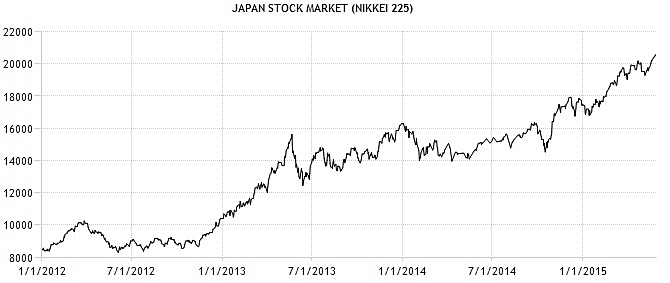 Japan’s benchmark stock index, the Nikkei 225, continued its winning run on May 29 by notching up an eleventh straight day of gains, the longest-winning run since a 13-day streak in February 1988. The Nikkei climbed 0.1% higher on that day to close at 20,563.15, its highest level in 15 years. The positive figures came on the back of the previous week’s news that the market capitalization of shares listed on the Tokyo Stock Exchange’s first section finally broke a 26-year record to hit ¥591.3 trillion ($4.8 trillion).
Japan’s benchmark stock index, the Nikkei 225, continued its winning run on May 29 by notching up an eleventh straight day of gains, the longest-winning run since a 13-day streak in February 1988. The Nikkei climbed 0.1% higher on that day to close at 20,563.15, its highest level in 15 years. The positive figures came on the back of the previous week’s news that the market capitalization of shares listed on the Tokyo Stock Exchange’s first section finally broke a 26-year record to hit ¥591.3 trillion ($4.8 trillion).
The previous day saw the yen weaken to a 12-year low against the dollar. The currency’s recent weakness has helped boost the stock performance of Japan’s export-driven businesses, such as Toyota Motor and Canon. Strong equity market sentiment in the US and Europe recently has also encouraged bullishness in the Nikkei. The annual ¥80 trillion monetary stimulus injected by the Bank of Japan was also recently reaffirmed by the central bank, which has provided additional equity market support.
The Nikkei 225 has generally been on an upward trajectory for the last 2½ years, with the exception of some relatively short-lived corrections during this period:

Source: Tokyo Stock Exchange | Trading Economics
A 57% rise in 2013 was followed by a modest 7% the following year, while so far in 2015 the Nikkei has gained 19%. Following a recession in the summer of 2014, the Japanese economy has now posted two positive quarterly growth figures of 0.3% and 0.6% for Q4 2014 and Q1 2015 respectively. Moreover, the country’s unemployment rate is at its lowest in 18 years, adding to the recent economic buoyancy. Sectors that have done well during the recent positive run include real estate, insurance and banking.
Much of Japan’s positive stock market performance has been credited to Prime Minister Shinzo Abe, through his much-vaunted policy of “Abenomics.” Three broad categories of government measures – expansionary fiscal policy, monetary easing and structural reform – shook Japan out of nearly two decades of economic stagnation. Soon after Abe’s re-election in December 2014, the government made clear its focus on improving corporate efficiency by introducing measures that encourage companies to increase their return-on-equity (ROE) figures. The newly introduced JPX-Nikkei 400 stock index, for example, will only list the top 400 companies as measured by a combination of ROE, operating profit and market cap.
The country is also still recovering from the economic impact of the Fukushima Daiichi atomic disaster in 2011, which is considered the worst nuclear-related incident since Chernobyl in 1986. Pressurised by public opposition to the nuclear industry, Japan’s response to the disaster was to shut down all reactors within the country. This forced utility companies to import fossil fuels and pay for major upgrades in accordance with revised safety standards, thus losing billions of dollars in the process. It was announced only last week, however, that nuclear power generation will resume via the Sendai nuclear plant, possibly in late July.

